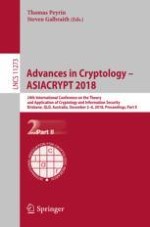2018 | OriginalPaper | Buchkapitel
Attribute-Based Signatures for Unbounded Languages from Standard Assumptions
verfasst von : Yusuke Sakai, Shuichi Katsumata, Nuttapong Attrapadung, Goichiro Hanaoka
Erschienen in: Advances in Cryptology – ASIACRYPT 2018
Aktivieren Sie unsere intelligente Suche, um passende Fachinhalte oder Patente zu finden.
Wählen Sie Textabschnitte aus um mit Künstlicher Intelligenz passenden Patente zu finden. powered by
Markieren Sie Textabschnitte, um KI-gestützt weitere passende Inhalte zu finden. powered by
